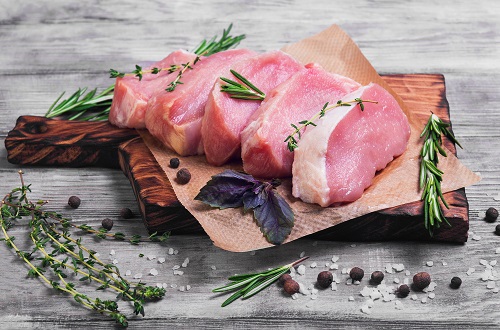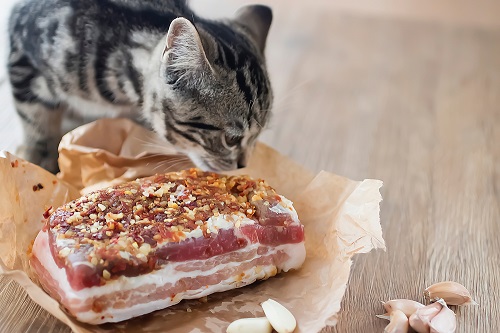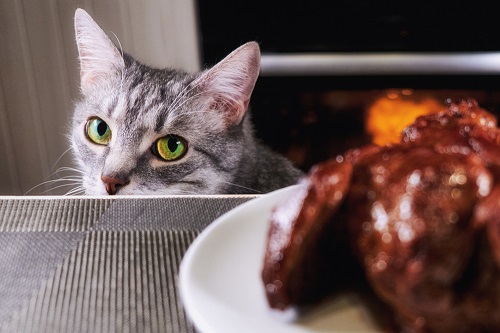Curious if your kitty can share some of your bacon or pork dishes? Find out – “Can Cats Eat Pork?” in our informative article!
If you are curious about the different types of meat that you can share with your feline friend, you have come to the right place. One type of meat that humans commonly consume is pork. Can Cats Eat Pork? Before you feed it to your beloved pet, it is important to be aware of the potential risks and benefits of feeding pork to your cat. In this article, we will explore the topic of cats and pork, including the nutritional value, the potential risks, and safe ways to incorporate pork into your cat’s diet.
Can Cats Eat Ham? Find out here
What Is Pork?

Pork is the meat that comes from pigs, which are domesticated animals. Pork can be eaten fresh, cured, or smoked and is used in a variety of dishes around the world. It is a popular meat in many cuisines and is a good source of nutrients.
Pork can be prepared in a number of ways, including roasting, grilling, frying, and stewing. Ham, bacon, salami, and hot dog are some of the dishes made from preserved pork. However, it is important to cook it thoroughly to avoid the risk of foodborne illness.
Can Cats Eat Pork?
So, can cats eat pork? Well, yes, in moderation, but it is not an essential part of their diet. If eaten in excess, pork can be harmful to them. Remember to cook it thoroughly before feeding it to your cat, as raw or undercooked pork can contain harmful bacteria.
It is always recommended to consult with a veterinarian before making any major changes to your cat’s diet.
Is Pork Toxic For Cats?

Pork itself is not toxic to cats, but it is not recommended to feed it to them in large amounts or as a regular part of their diet. It has a high-fat content, and consuming too much of it can lead to health problems in cats. Additionally, pork may contain added ingredients such as spices and seasonings that can be harmful to cats.
Does Pork Contain Any Nutritional Value For Cats?
Yes, pork does contain some nutritional value for cats.
- Proteins: Pork contains high-quality protein that is essential for a cat’s growth, maintenance, and repair of body tissues.
- Amino Acids: Pork also contains essential amino acids that cats cannot produce on their own, including taurine and arginine.
- Vitamins: It is a good source of essential vitamins such as B vitamins, including thiamin, niacin, and riboflavin, which support various functions in a cat’s body, including metabolism and energy production. Pork liver, in particular, is a rich source of vitamin A, which supports vision, skin, and immune system health.
- Minerals: Pork also contains minerals such as iron, zinc, and selenium, which support various bodily functions such as immune system function, wound healing, and healthy skin and coat.
How To Feed Pork To Cats?

If you decide to feed pork to your cat, here are some guidelines to follow:
- Cooked pork is the safest option for cats. Make sure the pork is cooked thoroughly, without any added spices or seasonings.
- Cut the pork into small, bite-sized pieces to make it easier for your cat to eat and digest.
- Introduce pork slowly into your cat’s diet and monitor them for any signs of food allergies or sensitivities.
- Do not feed your cat pork that is high in fat, such as bacon or sausage.
- Pork should not be a primary source of nutrition in your cat’s diet. It should only be given as an occasional treat.
Potential Risks Of Feeding Pork To Cats
- Digestive upset: Pork is high in fat and can cause digestive issues such as diarrhea, vomiting, and pancreatitis in some cats.
- Salt and seasoning: Pork may be seasoned with salt or other seasonings that can be harmful to cats in large amounts.
- Parasites: Raw or undercooked pork can contain parasites such as Toxoplasma gondii or Trichinella spiralis, which can cause serious health issues in cats.
- Bacterial infections: Raw or undercooked pork can contain harmful bacteria such as Salmonella, which can cause severe infections in cats.
- Bones: Pork bones can splinter and cause choking or intestinal blockages in cats.
- Allergic reactions: Some cats may be allergic to pork, which can cause symptoms such as itching, swelling, and breathing difficulties.
Can Cats Eat Pork Rinds?
While cooked pork is generally safe for cats in moderation, pork rinds are not recommended for them. They are high in fat, salt and may be difficult for cats to digest. Additionally, pork rinds may contain added seasonings or flavors that are not suitable for the feline gut. It is best to avoid feeding pork rinds to cats and stick to feeding them lean, cooked pork in moderation as a treat.
Can Cats Eat Pork? Quick Takeaways!
- So, can cats eat pork? Yes, they can, but they do not need to.
- Pork is not a requisite for a healthy feline meal.
- Pork is non-toxic for cats, so if you choose to give it to your kitty, ensure that it is thoroughly cooked.
- Avoid feeding seasoned pork to cats.
- Pork contains proteins, essential amino acids, vitamins, and minerals that can help in cats’ overall growth and development.
- Feeding pork to cats has risks, such as digestive upset, parasitic or bacterial infections, and allergic reactions.
- Cats can not eat pork rinds.
- It is recommended to consult with a veterinarian before making any significant changes to a cat’s diet.



